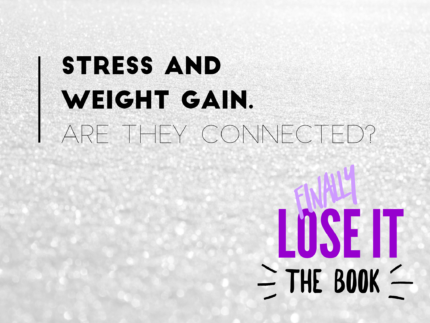What if I told you that losing weight had nothing to do with the food you eat, how much you exercise, or how much ‘willpower’ you have? While we know this isn’t entirely true, there is one very important aspect that is neglected when talking about weight loss resistance. The missing link is stress, more importantly how cortisol affects your body.
Now when I say stress you may want to throw your hands in the air, feeling like your stress level is out of your control. But it’s not just the stress from missing the bus or the looming deadline. It’s not even necessarily that tension you feel and your perception of life events. It’s often hidden stressors (such as chronic inflammation, infections, nutrient deficiencies etc) that are causing the biggest headaches (and weight changes).
What is cortisol?
In the face of a stressor, cortisol is released from the adrenal gland along with norepinephrine and epinephrine (aka adrenaline). It is used in almost every aspect of our health. After cortisol is released from the adrenal gland, it is circulated in the bloodstream, where it reaches our different organs and tissues. There are receptors for cortisol on almost every tissue in the body, meaning that it can change the function of each organ individually. Although it has many important roles in the body, we don’t want it too high or too low, or high or low at the wrong times. Ideally, cortisol release should be on a circadian rhythm: high in the morning, waking you up, and then a slow decline throughout the day to its lowest point at night. (This allows melatonin to rise so that you can go to sleep.)
The roles of cortisol in weight gain
It is easy to say that cortisol is involved with all aspects of our health but what exactly does it do?
- It regulates blood glucose levels. When your blood sugar drops, or in an emergency, cortisol can grab glucose from your other tissues (liver, muscles) and then pump it into the bloodstream.
- It lowers leptin, a hormone that tells your body how many fat stores you have, in the short term. It also stops your brain from listening to leptin over the long term. This increases your hunger, drive to food, lowers your metabolism and makes you more tired.
- It regulates your immune system. Both an overactive and underactive immune system are related here. You need cortisol to keep your inflammation levels in check.
- It regulates water control at the level of the kidney and, therefore, your blood pressure, water retention, and frequency that you pee.
- It affects your skin integrity and healing.
- It affects your memory, mental clarity, and ability to recall information. (FYI, chronic stress can actually shrink your hippocampus, a part of your brain involved in memory, learning, and emotion!)
Chronic stress
The stress that your body has to deal with isn’t just the individual situations you deal with. It also includes hidden stressors, such as blood sugar swings, hormonal imbalance, underlying infections, inflammation, disease, food intolerances, sleep disturbance, and many other factors unique to you.
It’s the accumulation of these stresses that wreak havoc on almost every system of your body as I outlined above. So do you think your cortisol may be out of whack?
Signs of altered cortisol levels
- Anxiety or depression
- Fatigue
- Brain fog
- Inflammation
- Immune system issues or autoimmune conditions
- Poor sleep (either a struggle to fall to sleep or waking up, specifically between 2:00 and 4:00am)
- Sugar, salt, and fat cravings
- Hormonal imbalances (losing your period, heavy period, intense cramps, PMS, infertility)
- Bloating, ulcers, and digestive issues
- Weight gain (specifically in the belly and upper back)
- Metabolic syndrome (diabetes, high cholesterol, and high blood pressure)
We need to take a whole body approach to treating the stressors in our lives; I know first-hand that weight both piles on and sticks like a magnet in stressful situations.
Now that you know the signs and symptoms to look for if you think you might have cortisol dysregulation. My book Finally Lose It will give you a complete breakdown of cortisol’s effect on weight, your body and ways to manage it.
Deep breaths, ladies. You got this.

